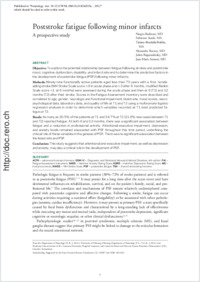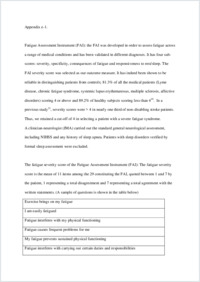Poststroke fatigue following minor infarcts
- Radman, Narges Department of Neurology, University of Fribourg, Switzerland
- Staub, Fabienne Lausanne University Hospital, Switzerland
- Aboulafia-Brakha, Tatiana Lausanne University Hospital, Switzerland
- Berney, Alexandre Lausanne University Hospital, Switzerland
- Bogousslavsky, Julien Center for Brain and Nervous System Disorders, Genolier, Switzerland
- Annoni, Jean-Marie Department of Neurology, University of Fribourg, Switzerland
-
2012
Published in:
- Neurology. - 2012, vol. 79, no. 14, p. 1422-1427
English
Objective: To explore the potential relationship between fatigue following strokes and poststroke mood, cognitive dysfunction, disability, and infarct site and to determine the predictive factors in the development of poststroke fatigue (PSF) following minor infarcts.Methods: Ninety-nine functionally active patients aged less than 70 years with a first, nondisabling stroke (NIH Stroke Scale score ≤6 in acute phase and ≤3 after 6 months, modified Rankin Scale score ≤1 at 6 months) were assessed during the acute phase and then at 6 (T1) and 12 months (T2) after their stroke. Scores in the Fatigue Assessment Inventory were described and correlated to age, gender, neurologic and functional impairment, lesion site, mood scores, neuropsychological data, laboratory data, and quality of life at T1 and T2 using a multivariate logistic regression analysis in order to determine which variables recorded at T1 best predicted fatigue at T2.Result: As many as 30.5% of the patients at T1 and 34.7% at T2 (11.6% new cases between T1 and T2) reported fatigue. At both 6 and 12 months, there was a significant association between fatigue and a reduction in professional activity. Attentional-executive impairment, depression, and anxiety levels remained associated with PSF throughout this time period, underlining the critical role of these variables in the genesis of PSF. There was no significant association between the lesion site and PSF.Conclusion: This study suggests that attentional and executive impairment, as well as depression and anxiety, may play a critical role in the development of PSF.
- Faculty
- Faculté des sciences et de médecine
- Department
- Médecine 3ème année
- Language
-
- English
- Classification
- Biological sciences
- License
-
License undefined
- Identifiers
-
- RERO DOC 31009
- DOI 10.1212/WNL.0b013e31826d5f3a
- Persistent URL
- https://folia.unifr.ch/unifr/documents/302763
Other files
Statistics
Document views: 184
File downloads:
- pdf: 382
- Supplementary material: 188

